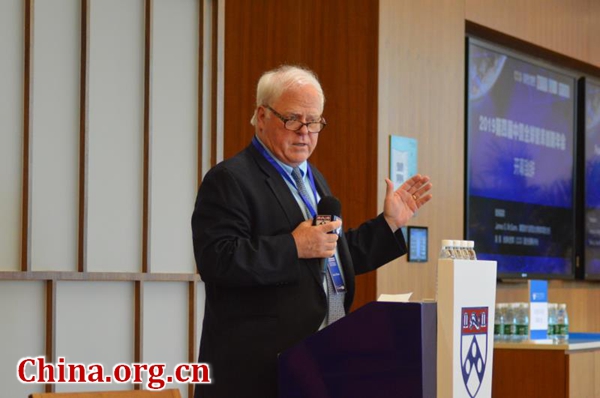Promoting development of China's think tanks through global vision
- By Zhu Bochen
 0 Comment(s)
0 Comment(s) Print
Print E-mail China.org.cn, May 31, 2019
E-mail China.org.cn, May 31, 2019

Leading global think tank experts took time off their usual work on May 28-29 to take part in a series of panel discussions held in the Penn Wharton China Center (PWCC) in Beijing, concerning innovation, internationalization and cooperation for think tanks around the world in the Fourth Industrial Revolution era.
As the main agenda of the Fourth Annual China Global Think Tank Innovation Forum, panel discussions focused on the role as well as the challenges facing think tanks in the context of a transformative age featuring great power competition.
The two-day event was co-organized by the Center for China and Globalization (CCG) and the Think Tanks and Civil Societies Program (TTCSP) of the University of Pennsylvania. The second day featured a 2019 High-level Seminar on World-Leading Think Tanks.
With the continuous impact of rapidly-advancing technologies on global development, rising tensions are a feature of today's transformative age, requiring think tanks around the world to seek innovation and breakthroughs to improve their role in global affairs. In this regard, mutual learning and collaboration especially between China and international think tanks are seen as being of great significance.
Professor James G. McGann, director of TTCSP, University of Pennsylvania, spoke at the opening session, addressing the challenges facing China's think tanks.
He declared: "Apart from the need for a stronger support of social science to improve the global competitivity of China's think tanks, technological changes and institutional reforms should also be taken into consideration. For example, the websites and publications of their studies must be at least bilingual so that their voice could be heard outside China.
"Also, the communication strategies they adopt with the rest of the world should be updated from the 1960s' model. More panel discussions with Western think tanks should be encouraged to exchange ideas and promote mutual learning."
During the following panel discussions, global think tank experts shed light on issues such as international and Chinese experiences of think tank innovation in the age of Globalization 4.0, talent development and think tank management during its innovation, as well as cooperation between think tanks to improve cross-border relations.
Tim Summers, senior consulting fellow of the Asia-Pacific Program of the Royal Institute of International Affairs (Chatham House), stressed the role that diversity plays in think tank development, as well as the global political environment.
"What Chatham House does is to promote the diversity of opinion and of voice in political debate. In view of today's transformative age, more diversity is required in the studies of think tanks as well as in the policy making procedures to cope with emerging uncertainties."
Professor McGann further noted that the products of think tanks must follow a digital pathway to avoid the waste of ideas as "journals and books are dead today." He also pointed out that, considering the advisory nature of think tanks, it had become crucial to redefine "who is the audience of their research, and how to reach the target readers."






Go to Forum >>0 Comment(s)